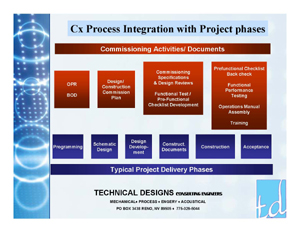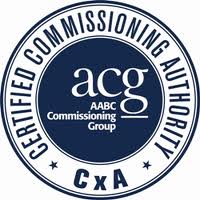Commissioning?
Jan 1st, 2018 The Commissioning Process is the Owner’s quality-oriented process for achieving, verifying, and documenting that the performance of buildings, systems, and assemblies meets defined objectives and criteria.

What is Commissioning?
Building commissioning is more than just functional testing of system. It is a systematic process to validate the project design against the Owner's project requirements, review the construction process, and document any changes made in the field during construction. The commissioning agent fills an important role as a 3rd party liaison representing the Owner during the construction process. Technical Designs prides themselves on making sure that all parties perform to contract documents and supporting the much needed follow up during and after construction. Technical Designs has provided Clients with tools such as online storage of video training materials as well as archived project documentation.
"The Commissioning Process assumes that owners, programmers, designers, contractors, and operations and maintenance entities are fully accountable for the quality of their work. The Commissioning Team uses methods and tools to verify that the project is achieving the Owner’s Project Requirements throughout the delivery of the project. The Commissioning Process begins at project inception (during the Pre-Design Phase) and continues for the life of the facility (through the Occupancy and Operations Phase). Because this standard details a process, it can be applied to both new and renovation projects as well as existing buildings. The Commissioning Process includes specific tasks to be conducted to verify that design, construction, verification, testing, documentation, and training meet the Owner’s Project Requirements. This standard describes the overall Commissioning Process in order to provide a uniform, integrated, and consistent approach for delivering and operating facilities that meet an owner’s on-going requirements."
BSR/ASHRAE/IES Standard 202P, Commissioning Process for Buildings and Systems, First Public Review Draft
Benefits of CommissioningThere are various Commissioning flavors...

LEED Commissioning
The US Green Building Council mandates all buildings to undergo some sort of building commissioning to make sure that building systems are installed and functional as designed. GSA and federal governmental agencies mandate building commissioning for all new construction projects. The largest single reason that buildings do not perform to occupants expectations is the follow up and validation that the building was constructed in accordance with the design documents.
Read more on LEED CxARetro Commissioning
Retrocommissioning (RCx) is a systematic process for identifying less-than-optimal performance in your facility equipment, lighting and control systems and making the necessary adjustments. While retrofitting involves replacing outdated equipment, RCx focuses on improving the efficiency of what's already in place.
Why is Cx Important to ConsiderAdvanced Commissioning Techniques
Technical Designs has developed inhouse expertise to provide advanced commissioning techniques. The basic concept behind this type of work is to baseline the building performance with actual data, model the building using inhouse metrics software, and "stress" the system using established variables to determine the building's current performace and "possible" performance. Not only does this method verify systems are functioning properly, but also where performance can be improved.
See more from Technical Designs on BEAP
What Cx is and isn't

Contact Technical Designs to learn more about Commissioning
"Selecting the commissioning provider represents one of the most important commissioning decisions that a building owner makes. The provider should be certified by a nationally recognized organization and have the requisite qualifications for the project that is being commissioned." Technical Designs is certified as a member of the AABC Commissioning Group with experience in all phases of commissioning work. ACG Website
Back
